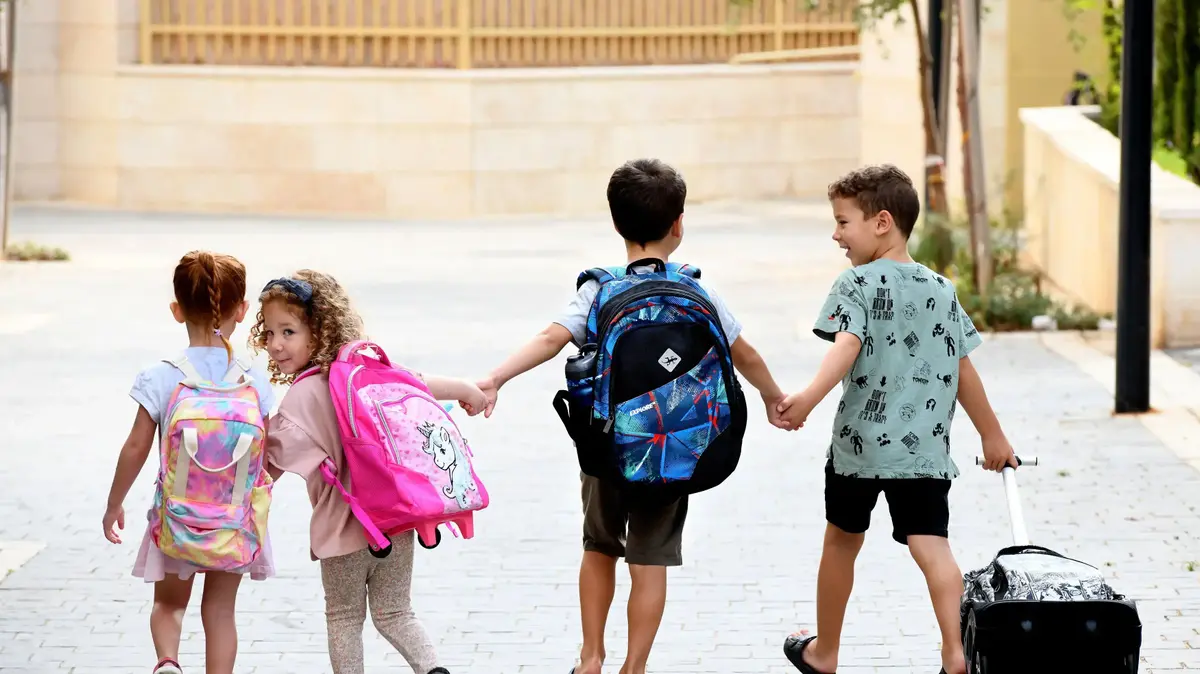Getting back to normal will not be easy.
This is how you prepare yourself (and the child) for her
Difficulties in transitions and separations accompany almost every parent and child on the way to kindergarten or school.
Just before the return to the frameworks, the psychologist Eyal Cohen explains how to deal with them and why the real preparation is actually the parents', not the children's
Eyal Cohen
31/08/2022
Wednesday, August 31, 2022, 06:24 Updated: 07:30
Share on Facebook
Share on WhatsApp
Share on Twitter
Share by email
Share in general
Comments
Comments
What does the return to routine evoke in you parents?
Children return to the frameworks (Photo: Reuven Castro)
Routine is important for parents and children alike, to increase our sense of daily certainty.
However, returning to routine after a long vacation invites quite a few difficulties.
Hundreds of thousands of children and parents are soon going to face the long-awaited return to normalcy.
Some will hear sentences like "Don't go! Loooo! Don't leave me alone", often accompanied by tears, others will go through the adjustment more easily - but for everyone the return to routine causes excitement and different challenges.
Yes strike?
Not a strike?
This is how you will help the children deal with the uncertainty
, so how do you return to the routine of school and kindergarten safely?
We prepare for the challenge, and do it by speaking in three stages:
1. Talk to ourselves (inner speech)
In order for our children to be able to adapt to the frameworks in a good way, we need to understand first of all what the return to routine arouses in us.
Tension?
Pride?
worry?
both?
And maybe also feelings of guilt that we are a little (a lot) tired of the "freedom" with them?
It is important to listen to our feelings, in all their shades, and not to obscure them.
These complex emotions exist in us anyway, and awareness of them is important so that we can control our behavior and not be triggered by them.
Or in other words, so that we understand why we behave the way we do.
In addition, we will think about what is the "agenda", our worldview about this complex institution called "school"?
What do we think of the teacher?
Do we trust her enough?
Which professions are more important to us, and which ones are less?
How do we remember ourselves as students?
'Accepted' or rejected?
and the like.
Through the questions we will clarify for ourselves what we think and feel about our child's framework, what we expect to happen in it and what we fear.
What are you most afraid of?
A sad boy in the school corridor (Photo: ShutterStock)
It's a complex process that requires time (at least a night or two, and it should also include a page and a pen...) and brings us together with good and bad parts of the framework experience we had as children.
This process is necessary so that we can give our child the confidence he needs in adapting to the framework.
Only after we have formulated and perfected our position towards kindergarten or school (or any other setting), is it time to talk to our partner - and preferably after they have gone through a similar process themselves.
2. Talking with our spouse
This is the stage where each of the parents presents the agenda he formulated in the previous stage.
It is important to talk about, among other things, how you think the child will do in kindergarten/school, what to watch out for, these cases will make you pick up the phone to the educator, how you imagine the child during recess, what do you think about using phones during recess, etc.
You can make a table of the common and the different between you.
It's time to focus on differences and gaps: you don't have to come to an agreement on their content, and in most cases you won't either, but it's very useful to come to an agreement about their mediation for the child when he encounters a certain difficulty.
In many cases, our children recognize exactly the differences between us and challenge them.
That is why it is important to arrive with a uniform foundation as much as possible.
At the end of this stage, you should be confident in the setting you are sending your children to.
If not, it's time to pick up the phone to a kindergarten teacher/teacher/counselor/professional and share your concerns and questions.
3. Talking with the child
This is the shortest part of the process, because most of the work has already been done before it.
In the conversation with the child, we will start by asking what he thinks about the framework that will start in a moment, we will listen to his expectations and concerns without offering solutions at this stage - we will only let him know that we are listening by finding out together with him what he would like (and not want) to happen in the new framework.
More in Walla!
This is what you should do when the child tells you that he is sad
Parental awareness: what kind of parents we want to be and how to get there
Parents of children with ADHD?
9 tips that will prepare him for the school year
The smart test that detects an increased risk of having a stroke - now on sale
After that, we will briefly share with him our thoughts on the framework he is going to: with excitement, anticipation and also with concerns (one or two concerns are enough and we will present the solution in case it will come true).
Here is the time to get excited, tear up, laugh and get closer to your children's experience.
Although it has been quite a few years since you were his age, the experiences from there have shaped who you are today.
This is the time to connect with them.
End the conversation with a message of confidence and love.
Be sure that the framework and the team that will receive him are good enough to develop him, trust your child that they will know how to grow in it, and yourself that you will know how to support them when needed.
It is important to remember that every problem usually has more than one solution.
The adaptation process is also difficult for us parents.
After all, and with all the "coolness" of the end of August without the summer camps - there is also a sad and apprehensive part of us when entering kindergarten or school, when we deposit our treasures for most of the day (even when he is already in the 11th grade...).
health
parenthood
Tags
back to school
adaptation
School
parenthood
Children








